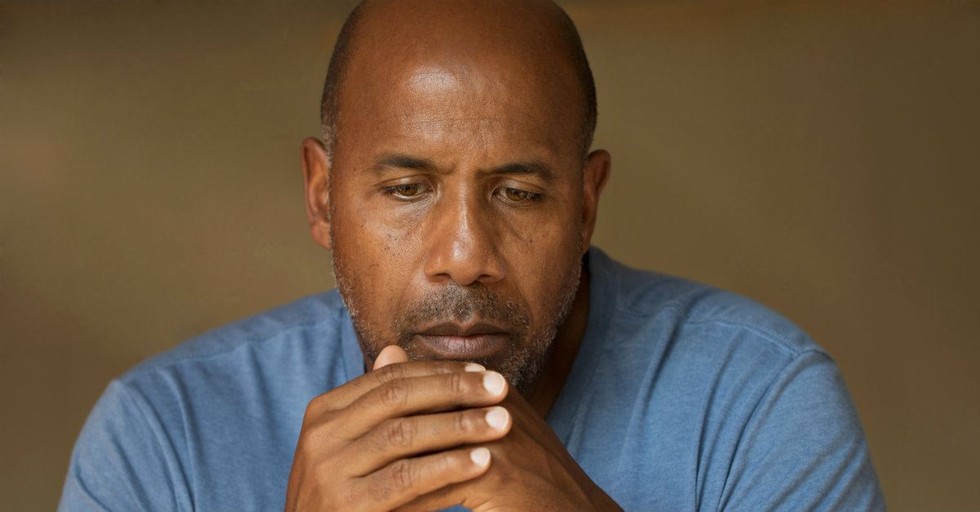


SUFFERING BURNS AWAY PRIDE
To keep me from becoming conceited because of these surpassingly great revelations, there was given me a thorn in my flesh, a messenger of Satan, to torment me. Three times I pleaded with the Lord to take it away from me. But he said to me, “My grace is sufficient for you, for my power is made perfect in weakness.” Therefore I will boast all the more gladly about my weaknesses, so that Christ’s power may rest on me. That is why, for Christ’s sake, I delight in weaknesses, in insults, in hardships, in persecutions, in difficulties. For when I am weak, then I am strong. 2 Corinthians 12:7-10
Suffering burns away pride, as it did in Paul’s life. When Paul prayed three times for the removal of his “thorn in the flesh,” he saw that it was God’s will for him, and he accepted it.
Many Christians are defeated at this point because they are not sure that they are in the will of God, so they are not sure if the suffering is really His will for them. Without going aside into a Bible study on knowing the will of God, we can just present this thought. Our great God “works for the good of those who love him…” (Romans 8:28). If we consciously submit to His will, He will give His divine direction. Our suffering and persecution can be placed in His hands by a simple act of our will. No believer needs to suffer alone and in doubt. Commit it all to the Lord (Proverbs 16:3).
In an unscheduled visit to Lat Village in Vietnam, a co-worker had the joy of visiting Father Tranh, the leader of the local church. Realizing the isolation and loneliness of this leader the group with our co-worker immediately asked how they could pray for him.
Not having an abundance of fellowship, he started sharing his hardships and needs. He confirmed the persecution and discrimination against the tribal people as already expressed by all the leaders they had met in Saigon. He shared the hardship of ministering to his people and the difficulties of restriction both by the police as well as the dense forest that limited his movements.
Father Thanh had 6,000 members in his congregation and found it an overwhelming task to be the only leader. “How do you do it brother?” the group asked. “How many people assist you in this enormous task?”
“I am only me!” he responded and immediately went on to conclude his answer, “but even though I am limited, the Holy Spirit is unlimited.”
RESPONSE: Today I will recognize that God may send suffering into my life to burn away my pride.
PRAYER: Pray for suffering church leaders around the world today—especially Father Thanh.


 | The Joy of Living From God Rather Than For Him CHRISTY NOCKELS Lee en español |
“Commit your way to the LORD; trust in him and he will do this: He will make your righteous reward shine like the dawn, your vindication like the noonday sun.” Psalm 37:5-6 (NIV)
Often, our enemy’s fiercest strategy against us as the beloved is keeping us consumed with living for God rather than living from God.
I know this to be true because I’ve lived it! There was a time in my life that I would often yes myself into exhaustion, determined to prove to God and others my worth and devotion. In this outside-in way of living, I hit the ground running every morning. The to-do list took precedence over my soul needs as I focused tenaciously on doing everything I thought I was supposed to be doing for God and even for myself so life would go as planned.
I had assumed I couldn’t afford the luxury of spending time with God, thinking I had far too many important responsibilities to be still before Him. When I did make time for Him, sadly, my priority was to ask Him to help me with everything: motherhood, home keeping, career-building. With a twinge of shame always lingering in my gut, I’d ask His forgiveness for failing to give Him more. Yet I had no more to give because my own strength was gone.
Don’t get me wrong. I longed to simply be still. I craved margin and rest and the capacity to put my family first. But I felt trapped, fearful if I said no to anything, I might miss out on the Next. Big. Thing.
This way of thinking not only set an unsustainable pace for my life, but it kept me self-focused, so much that I didn’t have the capacity to truly see others around me. I was usually in such a frazzled state that I valued community primarily for what it could do for me. For lack of a better word, this is hustling, and I’ve learned that God doesn’t always intervene right away when we strive at this kind of pace. Sometimes He gives us what we think we want so that we will finally discover what we truly need.
All in all, I believe this is God’s way of fighting for places in our hearts that we’ve either given up on or don’t even know need rescuing! In His mercy, God began to show me that my hustling was actually holding me back from living from my God-given identity as His beloved. An identity that offers rest, which propels us to trust Him wholeheartedly and to live from His strength rather than our own.
We see this propelling trust and rest in Psalm 37:5-6, “Commit your way to the LORD; trust him and he will do this: He will make your righteous reward shine like the dawn, your vindication like the noonday sun.” This is our invitation to live as the beloved of God! How beautiful, that as we surrender and trust in Him, He shows up on our behalf and does what only He can do in us, through us and for us!
Beloved, living from God lifts the burden, the stress, and the striving, and restores to us the joy of knowing God and loving Him. This joy is contagious! After all, He said if we would commit everything we do to Him, He would help us! If we will find our joy in Him, He will be the one to fulfill our deepest desires.
When we find our worth and joy in God again, we become available to Him and others in a way we never have before. Taking our place as the beloved of God, we come back to the center of it all — Jesus — the one who has already overcome this world we’re trying so desperately to survive in!
Heavenly Father, I’m so grateful You invite me to place my hopes, dreams and responsibilities in Your hands. You are faithful. Help me to rest in Your strength and draw closer to You today. In Jesus’ Name, Amen.
TRUTH FOR TODAY: Psalm 55:22, “Cast your cares on the LORD and he will sustain you; he will never let the righteous be shaken. (NIV)
RELATED RESOURCES: All too often, we find our priorities driven by a belief that what we do defines our value, both to God and to others. Christy Nockels has been there, too, and instead of living with misplaced value, she wants to help you live from your true identity as God’s beloved. Learn how and gain the contentment you long for in Christy’s new book, The Life You Long For. Learn more about the book and where to purchase it here.
CONNECT: Continue the journey even more and connect with Christy through her podcast, website, music, and on Instagram.
Enter to WIN your very own copy of The Life You Long For by Christy Nockels. To celebrate this book, her publisher will give away 5 copies! Enter to win by leaving a comment here. We’ll randomly select 5 winners and
REFLECT AND RESPOND: In what part of your life right now — such as work, family, ministry — do you feel it’s all up to you?
What can you do this week to recenter your heart in God’s truth and life from Him? Leave your thoughts in the comments.
© 2021 by Christy Nockels. All rights reserved.
Proverbs 31 Ministries thanks WaterBrook & Multnomah for their sponsorship of today’s devotion.
Click here to view our policy on 3rd party links.Proverbs 31 Ministries
PO Box 3189
Matthews, NC 28106
www.Proverbs31.org

Promise #55:
I will reward those who diligently seek Me with a heart of faith.
Hebrews 11:6 (WEB)
Without faith it is impossible to be well pleasing to him,
for he who comes to God must believe that he exists,
and that he is a rewarder of those who seek him.
The very foundation of our relationship to God is our faith in Him. If we don’t believe that He exists, it will be difficult for us to cultivate a living, loving relationship with Him. Our very salvation comes through our faith as Paul wrote in Ephesians 2:8-9… 8 for by grace you have been saved through faith, and that not of yourselves; it is the gift of God, 9 not of works, that no one would boast. (WEB)
God loves it when we choose to have faith in Him despite what our outward circumstances might be saying. In Hebrews 11, we read many accounts of the heroes of faith who believed God against all odds. My encouragement to you today is to declare God’s goodness and His love over your life whether you feel like it or not. Our feelings are not always accurate. They can deceive us at times.
So stand firm today my friend. Choose to believe that God exists and that He is the rewarder of those that diligently seek Him. Your faith and trust will move the heart of our God and Father like nothing else.
Love God And Love Others Well
Gifts
“For by grace you have been saved through faith. And this is not your own doing; it is the gift of God”.— Ephesians 2:8
Everyone enjoys opening presents. Though sometimes we open them with a smidgen of trepidation because we know the contents are bound to be unwanted, considering who the gift is from. That pile of ties, fruit cakes, and ugly knickknacks in the closet just keeps growing.
There’s one Loved One, however, whose gifts we would never relegate to a dark, forgotten corner: God. His gifts are always blessings. And unlike the people who send us gifts that they would like to receive, God grants us gifts that are just exactly what we need. His gift of salvation is the greatest of all these blessings, the incomparable gift. In Ephesians 2:8, Paul wrote that salvation “is not your own doing, it is the gift of God.” In other words, we can never earn God’s greatest gift. It is given — with no ulterior motives — because He loves us. We simply have to accept it.
Thank You, Lord, for the many blessings You shower upon me because You love me. Thank You especially for the gift of an eternity with You. Amen.
Jesus speaks…
Rest in My Presence, allowing Me to take charge of this day. Do not bolt into the day like a racehorse suddenly released. Instead, walk purposefully with Me, letting Me direct your course one step at a time. Thank Me for each blessing along the way; this brings Joy to both you and Me.



I do not at all understand the mystery of grace – only that it meets us where we are but does not leave us where it found us. ~Anne Lamott


God Has a Path
by: DaySpring

God has a path
for your feet to follow,
a plan for your heart
to discover,
and a purpose
for your life to fulfill.
As you walk with him
you will see the beauty
and wisdom of his ways.
Father, guide my steps in your purpose for me.
Give me the wisdom you promise,
so that every step I take fulfills your hopes for me
and the work of your kingdom in this time and place.
Today’s Reading: Psalm 119:105-106 NLT
Your word is a lamp to guide my feet
and a light for my path.
I’ve promised it once, and I’ll promise it again:
I will obey your righteous regulations.
Looking for more inspiration? You can find more resources for hope and encouragement, such as products to help you grow in your faith or resources in our article library on DaySpring.com.

Journey to the Cross: Quiet Time
by (in)courage

Immediately the Spirit drove him into the wilderness. He was in the wilderness forty days, being tempted by Satan. He was with the wild animals, and the angels were serving him. (Mark 1:12-13 CSB)
When I began studying ways to prepare my heart for Easter, something many know as the season of Lent, I read everything I could find about the time Jesus spent in the wilderness. While accounts can be found in three of the Gospels, the brief description in Mark is what resonated most deeply with me.
Thinking of Jesus, alone in the wilderness, being tempted by Satan, and surrounded by wild animals was a breath of fresh air to my distracted, weary soul. I feel alone! I’m tempted all the time! And yes, at times it feels like I’m surround by wild animals!
When we struggle to quiet our lives and our hearts enough to focus on God, Jesus knows exactly how we feel. And what I know from passages in Matthew and Luke is that, despite the desperate situation in which He found Himself, He resisted temptation. The angels served Him, He leaned on His knowledge of Scripture and faith in God, and He resisted.
So what does that mean for me, as I think about one more failed attempt at a simple quiet time? What does that mean for you, as you feel the hunger and isolation of wilderness or battle attacks from temptation of all kinds? As you long for communion with the Lord but feel unable to get there, to stay there, to remember why you were going there in the first place?
It means this: our Lord and Savior isn’t just the One who can quench our thirst and ease our pain. He is worthy of our praise and adoration, but He also is intimately familiar with our challenges and our struggles. He knows the strength it requires to seek Him and abide with Him, and He knows that, without Him, we will perish in the wilderness.
It means that not only is Jesus our goal when we set aside time for Him, He is our solution for fighting through all the distractions and temptations that work so hard to keep us away. It means that, no matter how barren and empty our personal wilderness may feel, we are not actually alone in our search for God. Just as the angels were with Him, Jesus is with us.
Dear Lord, thank You for going first into the wilderness – for showing us how important it is to get alone and quiet, to seek God, and to listen. Thank You for going with us when we face temptation and distraction – for giving us the tools we need to resist. Jesus, You are worth every effort it takes to quiet my mind and my heart. You are worthy of every minute I devote to You above all else. Please meet me in this place. Bind my wandering heart to Yours. Keep my eyes set on You. Thank You, Lord, for never letting me go. Amen.
This is an excerpt from Journey to the Cross: Forty Days to Prepare Your Heart for Easter, from the (in)courage community. If you are enjoying this series, you can purchase the book to experience forty days of encouragement and guided Scripture, reflections, and prayers.
When I began studying ways to prepare my heart for Easter, something many know as the season of Lent, I read everything I could find about the time Jesus spent in the wilderness. While accounts can be found in three of the Gospels, the brief description in Mark is what resonated most deeply with me. Thinking of Jesus, alone in the wilderness, being tempted by Satan, and surrounded by wild animals was a breath of fresh air to my distracted, weary soul. I feel alone! I’m tempted all the time! And yes, at times it feels like I’m surround by wild animals!

Choosing to Walk in Love

Choosing to Walk in Love
By: Anne Peterson
And walk in love, as Christ loved us and gave himself up for us, a fragrant offering and sacrifice to God. – Ephesians 5:2
All of us have choices. Our choices determine our actions.
God tells us we can choose to walk in love. And when we make that choice, our other choices follow suit. There have been times in my marriage when I didn’t walk in love. I reacted instead of responding. Reacting doesn’t take much thought.
One harsh word can elicit another. But when I’ve made the decision to walk in love, my actions will reflect it. Jesus walked in love. Everything he did was out of love. He answered people with grace, no matter what was going on. And when he needed time away from people, he drew away from the people, and went to talk to his Father. That’s exactly what we need to do when our emotions are too close to the surface.
When we are impatient, our words are shorter, more intense. But when we choose to walk in love, we are in tune with God. And he helps our words to be gracious. Then those we are interacting with feel valued.
I confess. At times I’ve been short with my husband, Mike. Sometimes rude. And that is not a fragrance at all, it’s a stench. So what do we do when we know our words will not be kind?
We stop. Breathe in and out. And ask God to give us his words. God tells us in Proverbs 3: 6, “In all your ways acknowledge him, and he will direct our paths.”
When God directs our paths, our words will lift someone up, instead of tearing them down. And if you find yourself feeling irritable toward your spouse, it could mean your emotional closet is full. Maybe you are storing things that need to be sorted out and forgiven. It’s happened to me.

One time, Mike asked me, “Do you remember that time I said ______? And I had to tell him, “No, I don’t remember.”
His response made me really stop and think.
Mike said, “Oh, you DIDforgive me.”
When we hold onto hurts, God can help us release them. And that is so freeing. God teaches us to love as he does. His love overlooks faults.
What would happen if each morning we made the decision to walk in love? It would change our days completely. Not only would our spouse feel loved, but we would also know that we were pleasing our Father.
But what about when your spouse isn’t being kind? What if his words are harsh? We need to remember what God tells us concerning our enemies, because that’s what it may feel like at the moment. Like our spouse is our enemy. But even then, we’re instructed to love our enemies. Nowhere does God tells us we can let someone have it. Not one place.
I love the story of Joseph, found in Genesis 37-45 who was mistreated to the max. If anyone had the right to react because of how he was treated, it was Joseph. But he didn’t. Though falsely accused, imprisoned, and at times forgotten, his attitude remained good. He still obeyed authority. In fact, Joseph’s attitude was so exemplary he was even promoted in prison. God honored Joseph because he kept entrusting himself to God.
This was especially evident when Joseph faced his own brothers, the ones who had thrown him in a pit when they were boys, leaving him for dead. When Joseph had the chance to take revenge on those who mistreated him, he chose not to. Instead, he extended mercy, and then he gave them grace. Joseph walked in love.
We need to reflect on those who walked with God, so we can make the right choices. And though Satan, will whisper things to us, making us want to retaliate, we can listen instead to the voice of the Holy Spirit. He will guide and direct us. And we can make the choice to walk in love, just like Jesus did.
Anne Peterson is a regular contributor to Crosswalk. Anne is a poet, speaker, published author of 14 books, including her memoir, Broken: A story of abuse, survival, and hope. Anne has been married to her husband, Michael, for 43 years. Sign up for Anne’s newsletter at www.annepeterson.com and receive a free eBook. Or connect with her on Facebook. Then you’ll hear about her new writings.
For More Great Resources for Christian Couples, Visit Crosswalk’s Marriage Channel.
At Easter, the Son of God took on the world’s sin and defeated the devil, death, and grave. How is it, then, that history’s most glorious moment is surrounded by fearful fishermen, despised tax collectors, marginalized women, feeble politicians, and traitorous friends?
In The Characters of Easter, you’ll become acquainted with the unlikely collection of ordinary people who witnessed the miracle of Christ’s death and resurrection. This FREE podcast provides a fresh approach to the Lenten season and can be used as a devotional or study for both individuals and groups.


10 Popular Disney Movies That Have Powerful Biblical Lessons
Michael Foust
ChristianHeadlines.com Contributor

Some 90 years ago, J.R.R. Tolkien told his new friend C.S. Lewis that man-made stories, though “they contain error,” reflect a “splintered fragment of the true light.”
Stories and myths, Tolkien believed, are a “reflection of the image of the Creator in us.” That’s because we are made in God’s image, and – in Tolkien’s view – “part of the imageness of God in us is the gift of creativity.”
In layman’s terms, this means that modern stories – even stories written by non-Christians – contain lessons, messages and themes that reflect the truth from Scripture. Put another way: All truth is God’s truth.
This applies to movies, too.
In fact, some of the best examples of mainstream movies with a “splintered fragment of the true light” are found in popular Disney movies, which often contain implicit – some would say “hidden” – biblical lessons.
Here are 10 popular Disney films that contain powerful biblical lessons. Of course, if any of these films contain content that troubles your senses, then give a filtering service like ClearPlay a try.
Photo courtesy: Mika Baumeister/Unsplash

1. Pete’s Dragon (2016, 1977)
A young boy named Pete strives to save an invisible dragon from being hunted and killed. The 1977 and 2016 movies offer slightly different plots, but the core messages about friendship, family and protecting those who are vulnerable are the same. The 2016 movie also emphasizes a unique apologetic-centric message: Faith requires believing in the unseen. “Just because you don’t see something doesn’t mean it’s not true,” Conrad Meacham (Robert Redford) tells his daughter. It’s a powerful lesson for both adults and children.
Photo courtesy: ©Disney

2. Beauty and the Beast (2017, 1991)
A woman named Belle willingly takes the place of her father as the captive of a prince-turned-beast, who is under a spell and must find true love if he is to turn back into his former self. The movie’s spotlight on true, inner beauty is one that every generation needs to hear. “Beauty is found within,” the narrator tells us. Belle – after falling for the beast – sings, “There is something in him I did not see.” The Bible tells us that beauty is “fleeting” (Proverbs 31:30) and that God looks not at our outward appearance, but “at the heart” (1 Samuel 16:7). Isn’t it nice when the message in a Hollywood movie mirrors Scripture?
Photo courtesy: ©Disney

3. Dumbo(2019, 1941)
A circus owner is horrified when the newborn elephant he had hoped would attract crowds – and deliver much-needed ticket sales – is born with huge, floppy ears. The newborn, he says, is a “freak.” But then the circus owner discovers the elephant’s amazing gift: It can fly. Dumbo delivers solid anti-bullying lessons about kindness, compassion and friendship. It celebrates our physical differences (one of the primary characters has only one arm). The plot can be used by Christian families as a bridge to discuss the “image of God” in all of us.
Photo courtesy: ©Disney

4. Clouds(2020)
A teenage boy dying of cancer begins writing music in the final years of his life. One of those tunes, called “Clouds,” becomes a worldwide hit. The film is based on the true story of Zach Sobiech, whose mom prayed that his shortened life would impact others. Her prayers were answered. Clouds includes messages seemingly stripped from Scripture: Don’t squander your life. Practice joy and gratitude. Asked what biblical passage he wants to be read at his funeral, he suggests the Parable of the Talents – the story where Jesus says His people have a responsibility to use their talents. “That one makes sense to me,” Zach says.
Photo courtesy: ©Disney

5. The Narnia series(2005, 2008, 2010)
These three films, based on the novels by C.S. Lewis, tell the story of four children who enter a wardrobe and discover a fantastical world (Narnia) inhabited by strange creatures. The movies are filled with Christian allegories about sacrifice and redemption, even if it’s not explicitly stated. In The Lion, the Witch and the Wardrobe (2005), Aslan the lion sacrifices himself in place of Edmund and is killed by the White Witch. Presumed to be dead, Aslan comes back to life to lead an army and defeat the witch. Even young children can appreciate the biblical parallel.
Photo courtesy: ©Disney

6. A Christmas Carol (2009)
A man named Ebeneezer Scrooge is given a chance to let go of his stingy ways after visits from the Ghosts of Christmas Past, Christmas Present and Future. This animated film is based on the classic Charles Dickens story and includes the same redemptive message from that 19th-century novel. It teaches us to live a life of generosity and compassion. It urges us to forgive. Most of all, it reminds us that it’s never too late to change for the better – even if you’re an old Scrooge.
Photo courtesy: ©Disney

7. Freaky Friday (2003, 1976)
A quarreling mother and teen daughter learn to appreciate one another after they mysteriously switch bodies and must live in the other’s shoes. The 2003 and 1976 versions differ slightly in the plot, but the core messages are the same: Listen to one another. Try to understand one another. Walk with grace and mercy. The movies urge us to love more and forgive more. The 2003 version is rated PG; the 1976 film is rated G.
Photo courtesy: ©Disney

8. The Lion King (2019, 1994)
A young, guilt-ridden lion flees his homeland out of a belief he is to be blamed for his father’s death. He then returns years later to boot a wicked ruler off the throne and to claim his rightful place as leader of the pride. The Lion Kingis a redemptive story about tragedy and second chances. It promotes family and fatherhood. It urges us to live in the present and the future, and not the past. For every guilt-ridden viewer who regrets a past mistake, it screams: Your life isn’t over.
Photo courtesy: ©Disney

9. Meet the Robinsons (2007)
A boy wiz named Lewis invents a time-traveling machine in order to meet the biological mother who placed him in an orphanage. But when he gets his chance to say hello, he changes his mind. (“I already have a family,” he says with a smile, referencing not only his adoptive parents but his friends.) Meet the Robinsons is a film that celebrates all aspects of adoption: the birth mother, the adoptive family, and everyone in between. It is a powerful reminder of Scripture’s command to care for and love the orphan (James 1:27).
Photo courtesy: ©Disney

10. Glory Road (2006)
The new head coach of a college basketball team in 1960s Texas opts to recruit players based on talent, not race. He subsequently leads his squad to a national title. The movie is based on the real-life story of the 1966 Texas Western Miners team that famously beat Kentucky with an all-black starting lineup facing an all-white team. (“I don’t see color. I see quick. I see skill,” says Texas Western Coach Don Haskins in the film.) It’s an inspiring movie about courage and sacrifice. Most of all, though, it’s a story about one team’s battle against racism and stereotypes. They wanted to be treated the same as everyone else. Scripture tells us “there is neither Jew nor Greek” in God’s kingdom (Galatians 3:28) – that everyone is made in God’s image (Genesis 1:27). That’s the core lesson in Glory Road.
Photo courtesy: ©Disney
Michael Foust has covered the intersection of faith and news for 20 years. His stories have appeared in Baptist Press, Christianity Today, The Christian Post, theLeaf-Chronicle, the Toronto Star andthe Knoxville News-Sentinel.

10 Ways to Hear from God Regularly
Whitney Hopler
Crosswalk.com Contributing Writer


God is constantly speaking to people. But too often, they miss out on hearing God’s messages because they seek His guidance only occasionally – usually when they’re going through a crisis or facing a major decision. Then, with a dire need to hear from God, people become confused and frustrated when they don’t clearly hear what they should do. They start to wonder how to hear from God and why they aren’t.
It doesn’t have to be that way. God wants everyone to hear His messages clearly, and it’s possible to do so. The key is to forget about formulas and gimmicks for hearing from God, and to focus instead on developing the kind of relationship with God that will empower you to hear God speaking regularly. The closer you get to God, the more you can enjoy ongoing conversations with Him, both listening and hearing from Him, and the more God will use those conversations to transform you into the person He wants you to become.
Here are 10 ways how you can hear from God and recognize his voice regularly:
*(Image Credit:Thinkstock)

1. Recognize that God created you for a personal relationship.
Slide 1 of 10
By design, the way you hear best from God is in the context of a friendship with Him. God intends for you to figure out His will freely and intelligently as you engage in regular conversations with Him. God’s will is to be personally present with you and speaking with you moment by moment as you go through life. Then you’ll grow to understand Him more and become more like His Son, Jesus.
*(Image Credit:©Thinkstock/digitalskillet)

2. Consider your motives for wanting to hear from God.
Slide 2 of 10
Honestly reflect on why you want to hear from God. Is it because you’re truly open to whatever God has to say and committed to putting His guidance into action and fulfilling His purposes, even when doing so is challenging? Or is it for a selfish reason, such as wanting to feel righteous or comforted? Confess and repent of any wrong motives. Ask God to give you an openness to hear and respond faithfully to what He wants to tell you.
*(Image Credit:Upsplash)

3. Make your goal more than just hearing God.
Slide 3 of 10
But seek first his kingdom and his righteousness, and all these things will be given to you as well. – Matthew 6:33
While it’s important to hear from God, that shouldn’t be your ultimate goal. Instead, make your main goal to become a spiritually mature person in a close relationship with God. That’s the only way you’ll clearly and correctly hear what God has to say to you.
*(Image Credit:©Thinkstock/palidachan)

4. Know that you’re important to God, but be humble.
Slide 4 of 10
Have the confidence that God is willing to speak to you just as powerfully as He did to the people in the Bible, because He values you just as much. However, don’t let pride creep into your soul, because you must be humble in order to faithfully receive and respond the messages God has for you.
*(Image Credit:©Thinkstock/Jupiterimages)

5. Don’t try to force God to tell you something.
Slide 5 of 10
No matter how much you want to hear from God about something or how hard you may try to convince Him to speak to you, you’ll only hear from God when He chooses to communicate with you. Focus on developing a respectful relationship with God and wait for His timing to deliver messages to you. Also, if God chooses not to give you specific guidance about something you’ve prayed about and what you’re considering is within the Bible’s moral principles, you can confidently go ahead and make your own decision about what to do and be within God’s will.
*(Image Credit:Upsplash)

6. Recognize that God communicates in many forms.
Slide 6 of 10
God may choose any one of many different ways to communicate to you, according to what’s best at particular times and in particular circumstances. You may sometimes hear God’s message in dramatic ways, such as through angels, visions, or miraculous events. But more often, you’ll hear God speaking through your thoughts, and He will use ordinary practices such as reading the Bible, praying quietly, learning from circumstances, or seeking counsel from other Christians to reach out to you as you think about them. God will use dramatic means to get your attention when necessary, but His goal is for you to be so closely connected to Him that you’ll pay attention whenever He speaks to you. Usually, God speaks through what people have described as a “still, small voice” to encourage those He loves to choose to keep walking closely with Him through life.
*(Image Credit:Thinkstock)

7. Renew your mind.
Slide 7 of 10
Since God often speaks to you through your mind and wants you to develop what the Bible calls the “mind of Christ” (the ability to make decisions as Jesus would), it’s crucial for you to follow the Bible’s urging in Romans 12:2: “Do not conform to the pattern of this world, but be transformed by the renewing of your mind. Then you will be able to test and approve what God’s will is – His good, pleasing and perfect will.” As you invite the Holy Spirit to renew your mind every day, He will cleanse it from such dirt and clutter as false beliefs and attitudes, unhealthy feelings, and misguided plans. Then the Holy Spirit will replace all of that with true thoughts that reflect God’s purposes.
*(Image Credit:Upsplash)

8. Invite the living Word to help you when you read scripture.
Slide 8 of 10
The Word of God is a living, creative force – Jesus Himself – and He is actively at work when you read God’s written word – the Bible – prayerfully. When you read the Bible, ask Jesus to make the Bible’s words come alive for you and become conduits through which He sends His thoughts, faith, and love into your soul. Then focus on what He sends you and orient yourself toward it so it will begin to transform your life.
*(Image Credit:Thinkstock)

9. Recognize God’s voice above all others.
Slide 9 of 10
By experience, you can learn to recognize God’s voice when He speaks, and to confidently respond to what He says. When thoughts recur, pray about them to discern if they may be coming from God. Keep in mind that God will never send you a message that contradicts the Bible’s principles. Also, God’s voice carries the weight of authority within it, and expresses a spirit of peace, confidence, joy, reasonableness, and goodwill. If you think that God may speaking to you, ask Him to confirm so as you study and meditate on the Bible, as you’re alert to the circumstances you encounter, or as you experience the Holy Spirit’s impressions in your mind.
*(Image Credit:Pexels)

10. Set aside time regularly to listen for God’s messages.
Slide 10 of 10
Make a habit of intentionally and expectantly listening for whatever God may want to tell you. It’s more important to become a person who listens regularly to God than it is to constantly ask God to give you guidance.
Set aside sometime today to begin listening for God’s voice and hearing his promises and plans for you. Keep a journal to remember the things he brings to life in you.
Editor’s note: This article was adapted from Hearing God: Developing a Conversational Relationship with God, copyright 2012, 1999, 1993, and 1984 by Dallas Willard. Published by Formatio, a division of InterVarsity Press, Downer’s Grove, Ill.
Whitney Hopler is a freelance writer and editor who serves as both a Crosswalk.com contributing writer and the editor of About.com’s site on angels and miracles.
Dallas Willard is professor of philosophy at the University of Southern California. He is the author of The Divine Conspiracy and The Spirit of the Disciplines. Visit his website.
*(Image Credit:Upsplash)

4 Things to Keep in Your “First Aid Kit” for Life’s Disappointments
Patricia Engler
Crosswalk.com Contributing Writer

At least the airbags didn’t go off, I thought, still clutching the steering wheel. And thankfully, I don’t think anyone was injured. Still, the bang when my car hit the SUV hadn’t sounded great. The sudden hiss of coolant hadn’t smelled great. And when I stepped into the winter air to face reality, the sight of my vehicle’s shattered headlight, smashed bumper, and mangled hood didn’t look great either.
But I don’t want another car...
This one had been perfect. An answered prayer. It may have been 12 years old, but with only 50,000 miles on it, I’d hoped—even prayed—to keep driving that little hatchback for years. I’d bought it just the summer before, after moving across the country. I’d sanded it myself, commissioned a neon green paint job for it, and named it Cricket.
Sometimes, coming out of a store and seeing that dash of green waiting in the parking lot was the closest feeling I had to coming home.
And now it was gone.
Disappointing losses have become a theme for many of us over the last while, haven’t they? Lost jobs, lost freedoms, lost dreams, lost travel plans, lost houses, lost normalcy. Those losses have hit me too—some of them temporary, others permanent. And I know that many people are facing far greater sorrows still.
Disappointment hurts. Like crazy. It’s a swift punch to the stomach, an ache behind the eyes, an unspeakable weight on the heart. How can you tend an injury which leaves you drained but doesn’t bleed?
The Bible reveals 4 types of important “first aid” for life’s disappointments:
Photo Credit: ©Unsplash/Josh Boot

1. Worship
Slide 1 of 4
When you’re reeling from life’s blows, praising God may be the last thing you feel like doing. Job, the guy from the ancient land of Uz, would understand. He lost all his wealth in a single day. And he lost every one of his ten children on the same day. Talk about grief.
What did Job do next? The Bible tells us, “Job arose and tore his robe and shaved his head and fell on the ground and worshiped. And he said, ‘Naked I came from my mother’s womb, and naked shall I return. The Lord gave, and the Lord has taken away; blessed be the name of the Lord’” (Job 1:20-21, ESV).
While I wouldn’t recommend a head shave in response to disappointment these days, worship remains an essential reaction to sorrow. Here are just a few of the reasons why:
When we worship, we’re declaring anew—to ourselves and to the spiritual realm—where our allegiance lies. Scripture reveals that Satan had ransacked Job’s life, at God’s allowance, because Satan was certain that Job would curse God (Job 1:9-11). This would have proved that Job only served God because God had blessed him. But Job’s worship proved otherwise.
When we worship, we’re reminding ourselves of reality. God is with us, God loves us, God is sovereign, and God is good. These truths do not depend on our circumstances but are grounded in God’s character and promises. And while our circumstances change, God’s character and promises do not. So, we worship in every season because God is worthy of worship in every season.
When we worship, we’re drawing closer to the Author of our hope. After all, when darkness presses in, we will not see more clearly by hiding from the Light. When burdens overwhelm us, we will not find their weight more bearable by turning from our Source of strength.
And when disappointments wound us, we will not receive comfort by running from the Healer.
Photo Credit: ©GettyImages/ipopba


2. Prayer
Slide 2 of 4
Prayer is a crucial reaction to disappointment for many of the same reasons worship is, bringing us closer to God when we recognize our need for Him the most. Prayer also plays a vital role in working through the aftermath of disappointments, as many types of disappointments leave us facing problems we didn’t have before—like the need for a new job, new house, or new vehicle.
These problems may seem like perfectly appropriate reasons to panic. But Philippians 4:6-7 (ESV) responds, “Do not be anxious about anything, but in everything by prayer and supplication with thanksgiving let your requests be made known to God. And the peace of God, which surpasses all understanding, will guard your hearts and your minds in Christ Jesus.”
Along with prayer’s effectiveness in helping us draw nearer to God and discover His peace, here are a few other reasons to pray after disappointments:
As James 5:16b (ESV) reminds us, “The prayer of a righteous person has great power as it is working.” God may not answer our prayers the way we think is best. But pouring out our hearts our Father in trust (Psalm 62:8) is never a waste.
By praying, we place ourselves in a renewed position of surrender. We’re reminding ourselves that we’re not the ones in control of everything; we don’t belong to ourselves (and none of our stuff does either). When disappointments knock us down, prayer lifts our eyes to the One our lives belong to, who’s truly in control.
One of the joys of surrender is the relinquishment of burdens. If we belong to God, then our problems are not our own to carry. Through prayer, we can follow the command of 1 Peter 5:7: “Cast all your anxiety on Him because He cares for you.”
Photo Credit: ©Amaury Gutierrez/Unsplash

3. Thankfulness
Slide 3 of 4
Like Philippians 4:6 revealed, one of the best types of prayer we can offer after disappointments are prayers of thanksgiving. Granted, we might not feel like expressing gratitude. But gratitude recalibrates our focus to the truth above our feelings, reminding us that the most significant blessings—like salvation—never change.
A relatively minor disappointment let me taste gratitude’s buoying effect firsthand. I’d been away visiting relatives and, on the morning of my drive back, realized that my favorite dress coat was nowhere to be found. It wasn’t an earth-shattering loss, but as I drove away without the coat, I still felt down. And my coffee cup was leaking. And my driver’s seat was spattered with mocha. What a day.
But then…I started reciting aloud some of the many reasons I had to be thankful.
“Thank You, Lord, for the vehicle I’m driving. Thank you for family to visit and for a home to drive back to. Thank you for the friends and church there waiting for me, and for work I love.” With every statement, I could feel the heaviness lifting a little more, peace flowing into its place. Almost against my will, I started smiling.
Here are a few reasons to apply gratitude’s healing salve to wounds of disappointment:
Gratitude itself is a form of worship, drawing us closer to God. As God said in Psalm 50:23 (ESV), “The one who offers thanksgiving as his sacrifice glorifies me.”
God wills for us to live a life of gratitude. Paul encouraged Thessalonian believers, “Rejoice always, pray without ceasing, give thanks in all circumstances; for this is the will of God in Christ Jesus for you.” (1 Thessalonians 5:17-18, ESV)
Gratitude can literally make us feel better. A wealth of research links gratitude to multiple health effects, boosting people’s well-being mentally—and potentially even physically. For instance, studies have found that people can experience reduced blood pressure and improved sleep after keeping a “gratitude journal.”
Because of Jesus, we will always have cause for thanksgiving.
Pastor Richard Wurmbrant, whose autobiography Tortured for Christ documents his sufferings while imprisoned in communist Europe, worded it this way: “There’s always a good reason to rejoice. There is a God in Heaven and in the heart. I had a piece of bread this morning. It was so good! Look now, the sun is shining! And so many here love me! Every day you do not rejoice is a day lost, my son!”
Photo Credit: ©Pexels/Negative Space

4. Trust
Slide 4 of 4
One reason we can be thankful amidst disappointment lies in the total trustworthiness of the God to whom we’re grateful. My dad, a hospital chaplain who regularly visits people experiencing major losses, emphasized this truth when I asked for his advice on responding to disappointment. He answered,
“I often remind people, especially Christians, of Matthew 5:4: ‘Blessed are those who mourn, for they shall be comforted.’ I encourage them, ‘Allow yourself to grieve, and to let God comfort you.’ The next step, trusting in God’s sovereignty, flows from that.
Trust allows us to ‘zoom out’ of the immediate picture around us and practice Proverbs 3:5-6: ‘Trust in the Lord with all your heart, and lean not on your own understanding. In all your ways acknowledge Him, and He shall direct your paths.’”
On that note, here are three biblical reasons to exercise trust:
An attitude of trust positions us to follow God’s will. Jesus modelled this attitude in Gethsemane, praying, “Father, if you are willing, remove this cup from me. Nevertheless, not my will, but yours, be done” (Luke 22:42, ESV).
Trust also positions us to recognize God’s faithfulness in action. Hardships I’ve encountered over the last couple of years have shown me to face any new problem with the prayer, “Thank You, Lord, for this opportunity to trust You. Please help!”
While not always in the way or timing I imagine, God never fails to answer, providing glimpses of His glory I never would have seen if life were easy.
God’s character is the definition of trustworthiness, so we can rest confidently in the hope of His promises. You can find just a few of these many promises in Hebrews 13:5, Psalm 30:5, and 2 Corinthians 4:17. One of my favorites is Romans 8:28: “And we know that for those who love God, all things work together for good, for those who are called according to his purpose.”
Looking Up
If I look a little bit up and to the right of where I’m typing this article, I can see that promise from Romans 8:28 written in bold letters. They’re black letters emblazoned against a green backdrop: the gas cap from my totaled car. The verse and gas cap stay on my bookshelf, a reminder of God’s sovereign goodness amidst disappointments—goodness we can sometimes only glimpse because of disappointments.
Through every high and low, every tide of happiness or grief, God remains worthy of our worship, prayer, thanksgiving, and trust. By acting on these truths in response to disappointments, we fix our eyes upwards on the Author of our hope.
And like Romans 5:5 (NKJV) assures us, hope does not disappoint.
Photo Credit: ©Unsplash/Bart LaRue
Patricia Engler is a Christian apologetics speaker, writer and Youth Outreach Coordinator for Answers in Genesis Canada. After 12 years of homeschool and a B.Sc. degree, she backpacked 360°around the world documenting how Christian students keep their faithat university. You can follow her stories and get connected at www.patriciaengler.com or answersingenesis.org.

How to Praise God for the Breakthrough You’re Waiting to See
Abby McDonald
iBelieve Contributor

“Are there certain areas of your life where you can’t seem to find breakthrough?”
I listened to the pastor and looked around the sanctuary. From the looks on people’s faces, it seemed as though the answer was a collective “yes.” This message prefaced an invitation to a fast the church would do together in the coming weeks. The pastor believed it would help bring the breakthrough so many of us needed.
While fasting is a powerful, biblical practice that can help us move forward in areas where we remain stuck, other elements of our lives also play a crucial part. Several years ago, I heard this word “breakthrough” over and over at the start of the new year, and I asked myself why so many of us stay in a state of inertia, even when we attempt to break free from the things holding us back.
After searching the Word, I saw a facet we tend to overlook: Breakthrough starts in the mind. If our thinking is not rooted in truth, we will never gain momentum by changing our physical habits. And while eliminating distractions can serve as a starting point for uncovering the lies we believe, our steps cannot stop there.
So what is one powerful way we can transform our minds? If we dig into Scripture, we see God’s followers turning to one way over and over: praise. As a matter of fact, in Psalm 30, we see David worship God for something he didn’t even see in his lifetime. David wrote this psalm to be sung at the temple dedication, but the temple wasn’t completed until after David died.
Even though the temple wasn’t built yet, David’s faith allowed him to pen the words anyway. He believed his son, Solomon, would finish the task. And because of his belief, the words flowed out of him.
What if we followed David’s example? What if our faith compelled us to praise God for the breakthrough we haven’t seen yet? For the answer to prayer, the promise fulfilled, and the healing we need? It would change us.
Sometimes God needs to do a work in us before he can move the mountain for us. Here are three ways to praise God for the breakthrough you haven’t seen yet.
1. Remember God’s Character
When we don’t see change or the progress we want, we need to remember God’s unchanging attributes. We can pray aloud, and remind him of his faithfulness, mercy and compassion. We don’t do this because God forgets, but because we do. As we proclaim the truths of who he is, our mental state often shifts because instead of focusing on the obstacle or difficulty, our focus is on the One who can help us through it.
We see a beautiful example of this perspective shift in the story of Hannah, who was barren. During her time, a woman’s worth was tied to her ability to have children, and Hannah could have let her affliction turn her into a bitter person. But instead, she poured out her heart to the Lord. She not only laid the desires of her heart before him, but she praised him for who he was.
“My heart rejoices in the Lord;
in the Lord my hornis lifted high.
My mouth boasts over my enemies,
for I delight in your deliverance.”
Hannah’s praise and remembrance of God’s character preceded her breakthrough. After this prayer in the temple, she conceived. But Hannah also realized that God was faithful whether her prayer was answered or not.
2. Remember God’s Deliverance in the Past
It is always good to keep a record of prayers God has answered, whether it’s in the form of a journal, a jar of blessings, or some other method. Doing so helps our forgetful minds keep track of all of the ways God heard us. When we go through a hard season and we don’t think God hears us, we can look back and see his deliverance.
Scripture is filled with examples of people doing this, and in the Old Testament the common method of remembering was building an altar. Often, God’s people also gave him a new name to help them remember an aspect of his character they saw through his intervention. When Moses led the Israelites from Egypt to the Promised Land, the Amalekites were a constant, formidable threat. They battled against the Israelites, but the Lord delivered Israel. As Joshua fought with his army, Moses lifted his hands up toward heaven with the help of Aaron and Hurr. Whenever Moses’ hands were raised, Israel’s army was successful in their fighting.
But after they won the battle, Moses didn’t gather his people and move forward to the next destination. He stopped and worshipped. He made sure he and his people would have a way to remember this victory.
“Moses built an altar and called it The Lord is my Banner.He said, “Because hands were lifted up againstthe throne of the Lord, the Lord will be at war against the Amalekites from generation to generation.” (Exodus 17:15-16)
3. Declare God’s Promised Victory over the Future
No matter what happens in the situation we’re facing, we can know one thing for certain: The ultimate battle has already been won. Jesus defeated our enemy, Satan, on the cross, and even though he has influence over the earth right now, his time is limited. One day he will be put in his place once and for all. When we worry about the future, we can take comfort in the fact that God is already there. He goes before us and behind us, and nothing comes as a surprise to him. We may be going through a tough season right now, but God will use it to do something beautiful in us and through us. It may take time and space to see it, but the transformation will happen if we maintain our faith.
Why is our faith so important? Because it is the ultimate way we will achieve breakthrough. Not by changing circumstances, but by unwavering faith.
“Foreveryone who has been born of God overcomes the world. And this is the victory that has overcome the world—our faith.” (1 John 5:4 ESV)
Praise and worship are a place the Spirit loves to inhabit, and a place the enemy hates. And as we lift our voices and songs declaring the breakthrough we haven’t seen yet, we create fertile ground for change to take place.
But then, we must take a step. Because you see, faith means not only believing and declaring the truth, but acting on it. It means giving feet to the proclamations we made with our mouths. This is when we see real growth. We have the divine opportunity to see God do the impossible, because we made a move in the sphere of the possible.
Is there a place in your life where you’re stuck? Do you long to see God move, but are at a juncture where you’re tempted to give up hope? Even if it’s difficult at first, praise him anyway. Do what you can in the earthly realm so that he can do what only he can in the heavenly one.
Your worship will create a stream in the wilderness. It will put fresh fire in your bones for the road ahead. And at the right time, breakthrough will come.
Photo Credit: © Pexels/Dương Nhân

Abby McDonald is a writer and speaker whose passion is to help women find the hope of Christ in the middle of life’s messes. She is the author of Shift: Changing Our Focus to See the Presence of God, and her work has been featured on Proverbs 31 Ministries, (in)Courage, For Every Mom, and more. Abby lives with her husband, three children, and mischievous lab pup in the mountains of western Maryland. You can download “The Daughter’s Manifesto” as her free gift to you and connect with her at abbymcdonald.org.
Want more interaction with the women of iBelieve? Join our fans, writers, and editors at the iBelieve Facebook group, Together in Faith, for more videos, stories, testimonies, prayers and more. Visit here to join the community!ShareTweetSave
Living Well Through Lent

Listening with All Your Heart, Soul, Strength, and Mind
February 24, 2021
Listening to Ourselves
Listening With All Our Soul
Reflection By Scott Stoner
Come to me, all you that are weary and are carrying heavy burdens, and I will give you rest. Take my yoke upon you, and learn from me; for I am gentle and humble in heart, and you will find rest for your souls.
– Matthew 11:28-29
The Soul quadrant of the Living Compass focuses on Spirituality and Rest & Play. One way in which these two areas intersect is with the spiritual practice of sabbath time.
The practice of taking time for sabbath is so crucial that it is one of the Ten Commandments. Whether we choose to observe one full day a week as a sabbath, or shorter periods of sabbath time throughout the week, any choice to be still and rest is genuinely a counter-cultural choice in our “busy-is-better” world.
Jesus talks about finding “rest for our souls,” which raises the question of what signs we might need to watch out for that are letting us know when our souls are tired and in need of rest. Here are a few signs that I have noticed in myself and others. See if any of these match your experience.
- Feeling chronically tired even when getting enough sleep.
- Compassion fatigue from giving so much of ourselves to others.
- Holding onto worries instead of releasing them into God’s care.
- Overworking and over-functioning to the point of exhaustion.
- Not being able to let go of mistakes you or others have made.
Listening to the signs of soul fatigue is the first step in addressing the problem. Next, we need to follow the words of Jesus in Matthew 11:29 and be “gentle and humble in heart” with ourselves and with others, as we turn to God for rest and renewal.
Making It Personal: As you pause and listen to your soul, do you hear any signs of soul fatigue? If so, gently and humbly name what you are experiencing. What is one specific thing you could do to create more sabbath time in your day or week, more time to turn to God for rest and renewal?
old lies, new truth
Do not conform to the pattern of this world, but be transformed by the renewing of your mind. — Romans 12:2

Old Lies, New Truth
by Craig Groeschel, from Winning the War in Your Mind


If we are going to demolish our strongholds, we have to recognize the power that lies have over us.
Are you also a prisoner, missing out on the life you want but believe you can never have? You crave close relationships but are paralyzed by the fear of rejection. You want to try something new but assume you are destined to fail. You long to be debt free and give generously but feel certain that could never be you. You dream of losing weight and exercising but feel resigned to fail yet again. You want to change but think you never can.
Why?
You are constrained by a lie, something that doesn’t exist. The Enemy has arranged enough hurtful circumstances, in key places of your life, in which you got just enough jolt — a bit of a shock, a sting of pain to your heart — that you have decided trying even one more time is just not worth the risk. What makes it worse is that the number of places where you have stopped trying is growing ever larger.
The greatest weapon in Satan’s arsenal is the lie.
Perhaps his only weapon is the lie. The first glimpse we have of the devil in the Bible, we see him deceiving Adam and Eve in the garden. He created doubt in Eve’s mind by asking her,
“Did God really say, ‘You must not eat from any tree in the garden’?”
The woman said to the serpent, “We may eat fruit from the trees in the garden, but God did say, ‘You must not eat fruit from the tree that is in the middle of the garden, and you must not touch it, or you will die.’”
“You will not certainly die,” the serpent said to the woman.
“For God knows that when you eat from it your eyes will be opened, and you will be like God, knowing good and evil.” — Genesis 3:1–5
What Satan did in the garden back then is the exact same thing he will attempt to do in your life today.
In 2 Corinthians 11:3, our thoughtology professor Paul said,
I am afraid that just as Eve was deceived by the serpent’s cunning, your minds may somehow be led astray from your sincere and pure devotion to Christ.
Satan will whisper accusing questions and deceptive statements. He schemes to twist your mind, because if he can, he then
- diverts you from your purpose,
- distracts you from God’s voice,
- destroys your potential.
If he can get you to believe a lie, your life will be affected as if that lie were true.
Unfortunately, Satan’s lies are easy to believe. Why? Part of the reason is that because of sin, we have a flawed internal lie detector. God warned us:
- “The heart is deceitful above all things and beyond cure” (Jeremiah 17:9).
- “There is a way that appears to be right, but in the end it leads to death” (Proverbs 14:12).
That’s definitely the problem, so what’s our solution? How do we access God’s power to stop Satan’s lies? How can we demolish his strongholds in our lives?
If Satan’s primary weapon is lies, then our greatest counter-weapon is the truth of God’s Word.
Not just reading the Bible but learning to wield Scripture as a divine weapon. God wants us to view His Word that way.
See how Hebrews 4:12 offers a direct solution to the warning
of Jeremiah 17:9:
The word of God is alive and active. Sharper than any double-edged sword, it penetrates even to dividing soul and spirit, joints and marrow; it judges the thoughts and attitudes of the heart.
In Ephesians 6:17, Paul’s legendary armor of God passage, the Word of God is called “the sword of the Spirit.” God’s Word was the first weapon I learned to use to remove lies and replace them with truth, changing both my thinking and my life.
Do not conform to the pattern of this world, but be transformed by the renewing of your mind. — Romans 12:2
The second half of that sentence is in the passive voice, meaning it is not something we do but instead something that is done to us. The good news is that God is ready to renew our minds by leading us to “a knowledge of the truth” (2 Timothy 2:25). Why? So we can “come to [our] senses and escape from the trap of the devil, who has taken [us] captive to do his will” (2 Timothy 2:26). “Then,” as Jesus said, “[we] will know the truth, and the truth will set [us] free” (John 8:32).
Excerpted with permission from Winning the War in Your Mind by Craig Groeschel, copyright Craig Groeschel.
. . . .
Your Turn
The enemy has come at us to separate us from God with lies from the beginning of time. The number one way we can combat his lies is by knowing the Word of God and not letting him confuse us when he bends it! The truth will set us free! ~ Devotionals Daily
Wisdom for Today
“Hope deferred makes the Lord heart sick, but a dream fulfilled is a tree of life.” – Proverbs 13:12